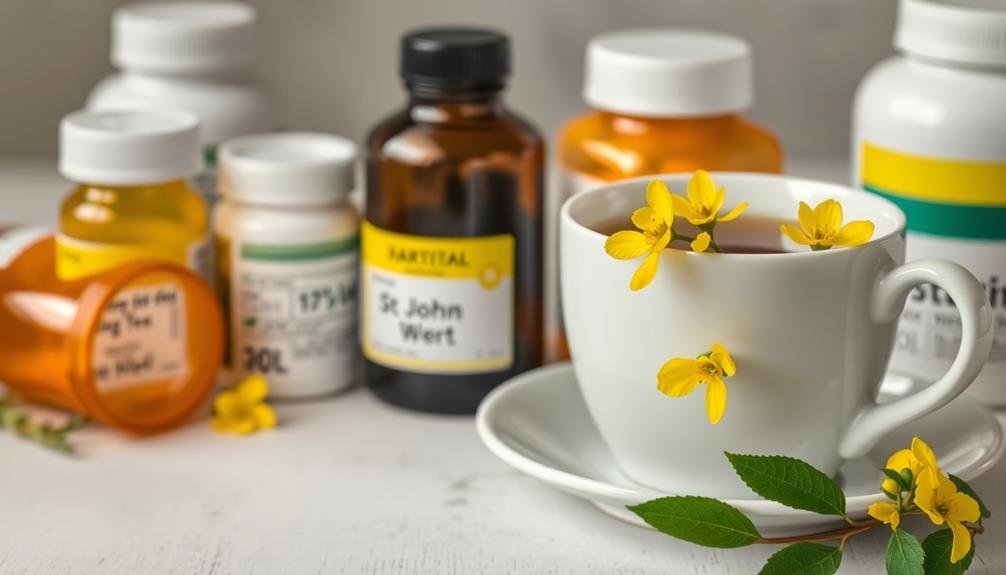Caution matters when using St John's Wort tea because it can interact negatively with various medications, like antidepressants and birth control pills. These interactions might lead to serious side effects, such as increased sensitivity to sunlight, gastrointestinal upset, and even symptoms of serotonin syndrome. If you've got allergies or are on other medications, it's essential to consult a healthcare provider before starting. Also, monitor how your body reacts by beginning with small doses. Understanding these risks guarantees you use St John's Wort safely and effectively. There's more to uncover about proper usage and safety measures.
Understanding St John's Wort

St John's Wort, a vibrant yellow flower, is well-known for its potential benefits in managing mood disorders. You might've heard that this herb can help alleviate symptoms of depression and anxiety. It has been used for centuries, with its roots tracing back to ancient Greece.
When you consider using St John's Wort, it's important to understand how it works. The active compounds in the plant, such as hypericin and hyperforin, are thought to influence neurotransmitters in your brain, potentially enhancing mood and reducing feelings of sadness.
You may find St John's Wort in various forms, including teas, capsules, and tinctures. If you're thinking about incorporating it into your routine, it's significant to know that the effectiveness can vary from person to person. Some users report positive changes in their mood, while others don't notice much difference.
Before diving in, you should consult with a healthcare professional, especially if you're already taking medications. St John's Wort can interact with several drugs, which could affect your overall treatment plan.
Understanding what this herb offers and how it fits into your wellness strategy is critical for making informed decisions.
Potential Side Effects
When considering St John's Wort tea, you should be aware of its potential side effects.
Common adverse reactions can occur, and there are also risks of drug interactions that might affect your medications.
Additionally, some people may experience allergic reactions, so it's important to proceed with caution.
Common Adverse Reactions
Using St John's Wort tea can lead to several common adverse reactions, so it's important to be aware of them before incorporating it into your routine.
One of the most frequently reported side effects is gastrointestinal upset, which can manifest as nausea, diarrhea, or stomach cramps. If you find your digestive system acting up, it might be a sign to reconsider your tea consumption.
You might also experience fatigue or dizziness, especially if you're new to St John's Wort. These symptoms can interfere with your daily activities, so pay attention to how your body reacts.
Another common issue is increased sensitivity to sunlight, which can lead to skin rashes or burns. If you notice any unusual skin reactions, it's wise to limit your sun exposure.
Some individuals report feelings of anxiety or agitation after consuming the tea, which is counterproductive if you're using it to manage mood.
Drug Interaction Risks
Many people don't realize that St John's Wort tea can interact with various medications, potentially leading to significant side effects.
If you're considering adding this herbal tea to your routine, it's important to be aware of the risks. Here are four common drug interactions you should watch out for:
- Antidepressants: Combining St John's Wort with prescribed antidepressants can increase serotonin levels excessively, risking serotonin syndrome, which is serious.
- Blood Thinners: This tea may reduce the effectiveness of anticoagulants like warfarin, putting you at risk for blood clots.
- Birth Control Pills: St John's Wort can lower the effectiveness of hormonal contraceptives, increasing the chance of unintended pregnancy.
- Anti-HIV Medications: Using this herbal remedy alongside antiretroviral therapy can reduce the effectiveness of these critical medications.
Always consult your healthcare provider before starting St John's Wort tea if you're on any medication.
Understanding these interactions can help you avoid unwanted complications while managing your health effectively.
Allergic Reactions Overview
Have you ever considered the possibility of allergic reactions when drinking St John's Wort tea? While many enjoy the benefits of this herbal remedy, it's important to recognize that allergic reactions can occur. Some people may experience symptoms like skin rashes, itching, or swelling after consuming the tea.
If you notice these signs, it's vital to stop drinking the tea and consult a healthcare professional.
Additionally, you might experience respiratory issues, such as difficulty breathing or wheezing, which could indicate a more severe allergic reaction. If you have a history of allergies to plants or herbs, you should exercise extra caution.
It's also worth noting that allergic reactions can develop over time; just because you've enjoyed St John's Wort tea without issues before doesn't mean you won't react later.
Always read the label and verify you're aware of any potential allergens present in the tea.
If you're unsure about your allergies or interactions with other medications, consider speaking with a healthcare provider before adding St John's Wort tea to your routine. Staying informed can help you enjoy your herbal tea without unwanted side effects.
Interactions With Medications

St. John's Wort tea may seem like a harmless herbal remedy, but it can interact with a variety of medications, potentially leading to serious side effects. If you're taking any prescription or over-the-counter drugs, you need to be cautious.
Here are some key interactions to take into account:
- Antidepressants: Combining St. John's Wort with other antidepressants can lead to serotonin syndrome, a potentially life-threatening condition.
- Birth Control Pills: This tea can decrease the effectiveness of hormonal contraceptives, increasing the risk of unintended pregnancies.
- Blood Thinners: If you're on anticoagulants, St. John's Wort may reduce their effectiveness, putting you at risk for blood clots.
- Antiretrovirals: For those managing HIV or AIDS, this herb can notably lower the effectiveness of certain medications, impacting your treatment.
Always talk to your healthcare provider before adding St. John's Wort tea to your routine.
It's essential to make informed decisions, especially when it comes to your health and well-being. Remember, just because it's natural doesn't mean it's safe!
Proper Dosage Guidelines
When considering adding St. John's Wort tea to your routine, it's essential to follow proper dosage guidelines. Generally, the recommended dosage for adults is about 300 to 900 mg of the dried herb per day, divided into two or three doses.
If you're opting for tea, one to two teaspoons of dried St. John's Wort per cup of water is a common starting point. This often translates to drinking the tea two to three times daily.
However, you should always start with a lower dosage to see how your body reacts. Monitor for any side effects like gastrointestinal issues, fatigue, or heightened sensitivity to sunlight.
If you're taking it to help with mood-related issues, consistency is key, and it may take a few weeks before you notice any benefits.
Foraging Considerations

Foraging St. John's Wort can be a rewarding experience, but you need to be cautious. Here are some key considerations to keep in mind while you're out in the wild:
- Identify Correctly: Make certain you're picking the right plant. St. John's Wort has yellow flowers and leaves with small translucent dots. Familiarize yourself with these characteristics to avoid mistakes.
- Check the Location: Look for plants in clean, unpolluted areas. Avoid spots near roads or industrial sites, as these can have harmful contaminants that may affect the plant's safety.
- Seasonal Timing: Harvest St. John's Wort when it's in full bloom, typically from late spring to early summer. This is when the plant contains the highest concentration of beneficial compounds.
- Respect Regulations: Be aware of local foraging laws. Some areas have restrictions on gathering wild plants, so check regulations to confirm you're foraging responsibly.
Safe Brewing Practices
To brew St. John's Wort tea safely, start with high-quality dried flowers or leaves. Make sure you're sourcing your herbs from a reliable supplier to avoid contamination with other plants. Use about 1-2 teaspoons of the dried herb per cup of water.
Next, bring your water to a boil, then remove it from heat. Add the St. John's Wort and let it steep for about 10-15 minutes. This allows the beneficial compounds to infuse into the water effectively.
After steeping, strain the tea into your cup, discarding the plant material.
It's important to remember that St. John's Wort can interact with various medications, so consult your healthcare provider before enjoying this tea regularly. Avoid brewing large quantities to keep your consumption controlled.
Lastly, if you're new to St. John's Wort, start with a smaller amount to see how your body reacts. Monitor any side effects, and discontinue use if you experience adverse reactions.
Frequently Asked Questions
Can St John's Wort Tea Be Used for Pets?
You shouldn't use St John's Wort tea for pets without consulting a veterinarian. It can interact with medications and cause side effects in animals. Always prioritize your pet's health and safety before trying new remedies.
Is St John's Wort Safe During Pregnancy?
St. John's Wort isn't generally safe during pregnancy. It can interact with medications and affect hormone levels. Always consult your healthcare provider before using it, ensuring you prioritize your health and your baby's well-being.
How Long Does It Take to Feel Effects?
You'll typically start feeling effects from St. John's Wort tea within four to six weeks of consistent use. However, individual responses vary, so it's crucial to monitor how you feel during this period.
Can I Combine St John's Wort With Other Herbal Teas?
You can combine St John's Wort with other herbal teas, but be cautious. Some combinations might interact negatively, affecting your health. Always consult a healthcare professional before mixing herbal remedies to guarantee safety and effectiveness.
What Should I Do if I Miss a Dose?
If you miss a dose, take it as soon as you remember. If it's close to the next dose, skip the missed one. Don't double up; just continue with your regular schedule.
In Summary
In summary, while St John's Wort tea can offer potential benefits, it's essential to approach it with caution. Be aware of possible side effects and interactions with medications, and always stick to proper dosage guidelines. If you're foraging, verify you're identifying the plant correctly, and practice safe brewing methods to avoid contamination. By taking these precautions, you can enjoy the tea's advantages while minimizing risks to your health. Stay informed and make safe choices!





Leave a Reply